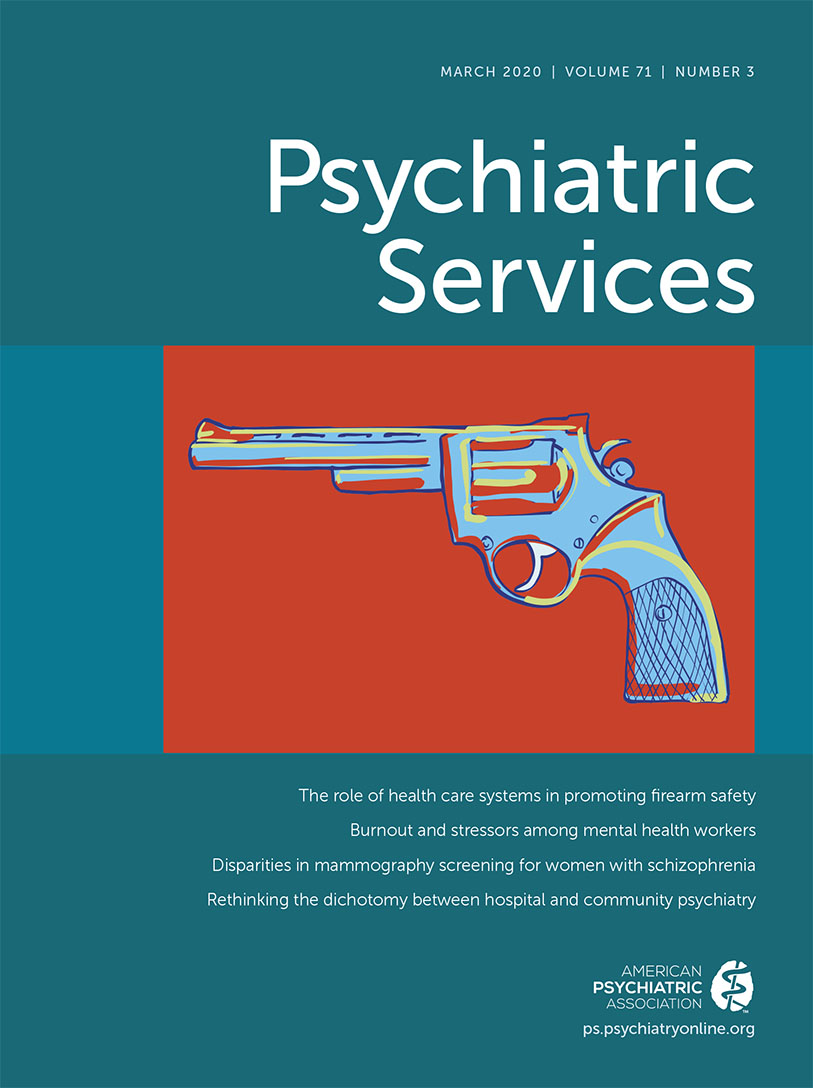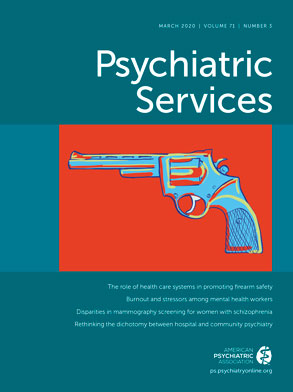The Taking Issue for the October issue of
Psychiatric Services (
1) comments on our Open Forum discussing current evidence and encouraging further research on the potential usefulness of financial incentives to enhance medication adherence in severe mental illness (
2). We appreciate Ms. Peterson-Dana’s reflections and read with interest her comments, some of which merit further discussion.
After briefly describing one of the two randomized clinical trials we reference showing the efficacy of financial incentives to increase medication adherence in severe mental illness, the author quotes our statement, “when implementing this strategy, measures must be taken to ensure that patients are consenting freely and not out of pure financial need,” immediately commenting, “Yet people motivated by monetary incentives have some economic need. Coercion seems unavoidable when people receive needed resources for medication compliance.”
First, not all people motivated by monetary incentives are in need. For instance, many companies provide bonuses to incentivize productivity. Are all employees who work hard to obtain a bonus in need? If not, what motivates their behavior? Are these companies coercing their employees? The forces shaping human behavior are complex, and the answer depends mostly on the individual’s circumstances and on how the incentivization is framed. However, we agree with Ms. Peterson-Dana that offering financial incentives to patients who are in need presents a substantial ethical challenge, which is why we stress that incentives functioning as financial aid “would not be the purpose of this strategy” and that “monetary incentives should be offered in a tailored manner, with clear and predefined operating procedures known to the clinical team.” We believe the true implementation challenge resides in carefully identifying which patients could benefit from this approach and how to implement this individualized strategy within a given health system. Thus, we encourage further research, particularly quality improvement and implementation research, but also further research on the efficacy of such strategies in head-to-head trials as well as with other antipsychotic formulations, to help determine “the right amount of compensation, how long the payments should last, the subgroup of patients that can benefit the most, or how this approach can be implemented in a variety of diverse clinical settings and health systems” (
2).
Second, coercion is the “act or process of persuading someone forcefully to do something that they do not want to do,” whereas incentivization is “the act or process of providing incentives to make something more attractive” (
3). Unfortunately, much of what health care professionals do, particularly in mental health, involves persuading people to do something that they might not be eager to do (e.g., take medication, exercise, stop smoking), but we do not consider this coercion because of the full conviction that such persuasion is in the patient’s best interest and a reasonable expectation that the patient’s health will improve in the long term. Incentivizing decisions that are consistent with long-term goals desired by patient, family, and physician follows the same principles and shares the same goals (e.g., take medication, exercise, stop smoking). Persuading, or incentivizing, is not coercing. For more information, the ethics involving incentivization are discussed in depth in the context of existing ethical theories applied to community mental health in one of our references (
4).
The author continues: “Research shows that some individuals can successfully use reduced amounts or discontinue some prescribed drugs when in psychiatric care. These findings call into question incentives to encourage medication compliance and instead highlight the value of continued dialogue and flexibility with prescribers.”
Unfortunately, we fail to understand how the fact that some patients may be able to discontinue medication calls into question any measure to enhance medication adherence for patients who should not or cannot discontinue it. The goal of any adherence-enhancing strategy, such as financial incentives, is to increase or maintain adherence for patients who need and have accepted, ideally after a shared-decision making process, a given pharmacological treatment or intervention. Continued dialogue and prescriber flexibility can coexist with financial incentives or any other adherence-enhancing strategy. As the treatment itself, any adherence-enhancing strategy should be tailored and revisited periodically, being adjusted according to the patient’s needs (
2). Thus, “continued dialogue and flexibility of the prescriber” and financial incentives to enhance medication adherence are not mutually exclusive.
We strongly agree with the author that considering the family environment and prioritizing shared decision-making processes can be a good strategy for “enduring recovery.” We never said otherwise. In modern psychiatry, the discussion about what treatment to start, if any, and for how long, or whether to add or offer any adherence-enhancing strategy such as financial incentives should be shared, discussed, and constantly revisited, taking into account all elements of the patient’s environment and carefully balancing the patient’s and family preferences. As health care professionals, however, we are also obligated to practice evidence-based medicine and avoid statements that could be misinterpreted regarding the critical need for medical treatment in severe mental illness. Furthermore, we cannot minimize the potentially serious consequences of medication nonadherence for patients and families, including a psychotic relapse and rehospitalization. In fact, this discussion highlights the false dichotomy that often exists concerning the facilitation of adherence, be it the use of financial incentives or the use of long-acting injectable medications. The goal of any such strategies is not to reduce the patient’s autonomy or encourage the use of medication that is not indicated. The goal is to help the patient garner the benefits of the indicated medication by actually taking it. The decisions regarding the suitability of a prescription at a given time should not be confounded with facilitation of adherence.
Therefore, we believe it is worth contemplating and encouraging further research on adherence-enhancing strategies such as financial incentives, while acknowledging its implementation challenges, particularly if such a strategy is supported by very encouraging data derived from well-conducted randomized clinical trials. We certainly welcome alternative approaches backed by appropriate clinical trial evidence.
The time has come to destigmatize nonadherence. To alter one’s patterns for taking medication does not mean that the person is a “bad” patient; nonadherence is part of human nature, regardless of the condition, its severity, and the evidence for treatment effectiveness. Most of us have missed doses of prescribed treatments for a myriad of reasons, including change in routines, side effects, perceived lack of immediate benefit, not realizing or appreciating the long-term advantages of treatment, or simply trying to minimize or ignore the reality of having an illness. By clearly stating the proven risks and deleterious effects of nonadherence, as we also discuss the risks and benefits of any treatments that we prescribe, and offering alternatives to help enhance adherence, we aim to empower patients and “maximize their self-determination,” a goal we share with Ms. Peterson-Dana. Approaches to enhance adherence, particularly backed by data, such as financial incentives, merit further study, alone or in combination with other strategies. We strongly believe that joining forces and adding and complementing strategies, instead of contraposing them, can lead to better outcomes.

